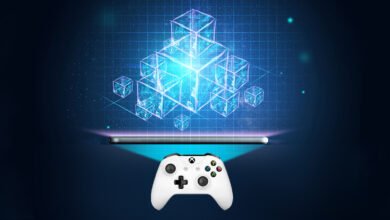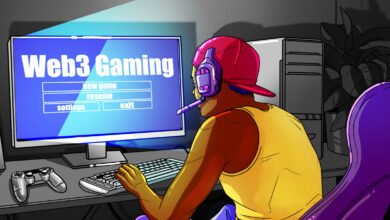Incredible Web3 Gaming Breakthroughs Changing the Future
Discover how Web3 gaming breakthroughs are revolutionizing digital entertainment with blockchain technology, NFTs, and decentralized gaming experiences.

The Web3 Gaming Breakthroughs Changing the Future in the industry stand at the precipice of a monumental transformation. Web3 gaming represents more than just technological advancement—it embodies a fundamental shift toward player ownership, decentralized economies, and unprecedented interactive experiences. As traditional gaming models face limitations in player autonomy and economic participation, blockchain gaming emerges as the solution that promises to revolutionize how we perceive digital entertainment.
The convergence of blockchain technology, non-fungible tokens (NFTs), and decentralized finance (DeFi) has created an ecosystem where players become true stakeholders in their gaming experiences. Unlike conventional gaming platforms, where players invest time and money without retaining ownership of in-game assets, Web3 gaming platforms enable genuine asset ownership, cross-game interoperability, and sustainable play-to-earn mechanisms.
This revolutionary paradigm extends beyond mere technological innovation. Decentralized gaming represents a cultural shift toward community-driven development, where players influence game mechanics, economic structures, and future developments. The integration of smart contracts ensures transparent, automated transactions while cryptocurrency gaming introduces real-world value to virtual achievements.
As we explore these incredible Web3 gaming breakthroughs, we’ll examine how metaverse gaming, GameFi protocols, and blockchain-based games are reshaping the entertainment landscape. From play-to-earn models that provide sustainable income streams to NFT gaming assets that retain value across multiple platforms, these innovations are creating unprecedented opportunities for players, developers, and investors alike.
Blockchain Technology: The Foundation of Gaming Evolution
Blockchain technology serves as the cornerstone of Web3 gaming innovation, providing the infrastructure necessary for transparent, secure, and decentralized gaming experiences. The immutable nature of blockchain ensures that player achievements, asset ownership, and transaction histories remain permanently recorded and verifiable across all platforms.
Decentralized Game Architecture
Traditional gaming architectures rely on centralized servers controlled by gaming companies, creating single points of failure and limiting player autonomy. Decentralized gaming architecture distributes game logic across multiple nodes, ensuring greater stability, resistance to censorship, and community governance. This blockchain gaming approach enables players to participate in game governance through decentralized autonomous organizations (DAOs), where community members vote on game updates, economic policies, and feature implementations.
The implementation of smart contracts automates game mechanics, reward distributions, and asset transfers without requiring intermediaries. These self-executing contracts eliminate the need for trusted third parties while ensuring that game rules remain transparent and immutable. Web3 gaming platforms leverage smart contracts to create sophisticated economic systems where player actions directly influence in-game economies and reward structures.
Interoperability and Cross-Platform Assets
One of the most significant Web3 gaming breakthroughs involves asset interoperability across different games and platforms. NFT gaming assets can be transferred between compatible games, allowing players to utilize their digital collectibles across multiple gaming experiences. This cross-platform functionality creates unprecedented value for digital assets while encouraging collaboration between different gaming ecosystems.
Blockchain-based games utilize standardized token protocols that enable seamless asset transfers and interactions. Players can earn rare weapons in one game and utilize them in another compatible title, creating a unified gaming metaverse where digital assets maintain consistent value and functionality.
NFT Integration: Revolutionizing Digital Asset Ownership

Non-fungible tokens (NFTs) have transformed how players perceive and interact with digital gaming assets. Unlike traditional in-game items that remain trapped within specific platforms, NFT gaming assets exist independently on blockchain networks, ensuring true ownership and transferability.
Unique Digital Collectibles and Rare Items
Web3 gaming platforms create unique digital collectibles through NFT technology, enabling players to own truly rare and valuable in-game items. These blockchain gaming assets can include character skins, weapons, land parcels, and even entire game characters. The scarcity and uniqueness of these NFT gaming assets create vibrant secondary markets where players can trade, sell, or lease their digital possessions.
The integration of NFTs in gaming extends beyond simple collectibles to include utility tokens that provide access to exclusive content, special abilities, or governance rights within gaming communities. These multifunctional assets enhance player engagement while creating sustainable economic incentives for continued participation.
Ownership Verification and Authenticity
Blockchain technology ensures the authenticity and provenance of NFT gaming assets through immutable record-keeping. Players can verify the rarity, creation date, and ownership history of their digital assets, preventing counterfeiting and ensuring fair market valuations. This transparency creates trust within Web3 gaming communities while establishing reliable secondary markets for digital collectibles.
Play-to-Earn Models: Sustainable Gaming Economies
Play-to-earn gaming represents a paradigm shift from traditional entertainment consumption to productive digital labor. These GameFi models enable players to generate real-world income through skilled gameplay, strategic asset management, and community participation.
Economic Incentive Structures
Cryptocurrency gaming platforms implement sophisticated economic systems that reward player contributions through token distributions. Players earn gaming tokens by completing quests, participating in battles, breeding digital creatures, or contributing to game development. These rewards can be converted to fiat currency or reinvested into additional gaming assets.
Web3 gaming platforms carefully balance token economics to ensure sustainable growth while preventing inflation that could devalue player earnings. Through algorithmic adjustments and community governance, these platforms maintain healthy economies that benefit all participants.
Global Accessibility and Financial Inclusion
Play-to-earn models provide economic opportunities for players worldwide, particularly in regions with limited traditional employment options. Decentralized gaming platforms operate without geographical restrictions, enabling global participation in digital economies. This accessibility has created new forms of digital employment while demonstrating the potential for Web3 gaming to address real-world economic challenges.
Metaverse Integration: Immersive Virtual Worlds
Metaverse gaming represents the ultimate expression of Web3 gaming innovation, creating persistent virtual worlds where players can live, work, and interact across multiple gaming experiences. These interconnected digital universes combine gaming, social interaction, commerce, and entertainment into comprehensive virtual ecosystems.
Persistent Virtual Environments
Blockchain-based games within the metaverse maintain persistent virtual worlds that continue evolving even when individual players are offline. These environments feature dynamic economies, seasonal events, and community-driven narratives that create rich, immersive experiences. Smart contracts govern land ownership, resource distribution, and economic transactions within these virtual worlds.
Metaverse gaming platforms enable players to purchase, develop, and monetize virtual real estate through NFT technology. Virtual land parcels can be developed into gaming venues, social spaces, or commercial establishments that generate ongoing revenue streams for their owners.
Social and Economic Integration
The integration of social features within Web3 gaming platforms creates vibrant communities where players can collaborate, compete, and trade across multiple virtual environments. Decentralized gaming protocols enable cross-platform communication, shared economic systems, and collaborative gameplay experiences that transcend individual game boundaries.
Smart Contracts: Automating Game Mechanics
Smart contracts revolutionize game development by automating complex game mechanics, ensuring transparent rule enforcement, and enabling sophisticated economic systems. These self-executing contracts eliminate the need for centralized game masters while providing guaranteed execution of game rules and reward distributions.
Transparent Rule Enforcement
Blockchain gaming platforms utilize smart contracts to ensure that game rules remain consistent and tamper-proof. All players can verify game mechanics, probability calculations, and reward algorithms, creating unprecedented transparency in gaming operations. This transparency builds trust within gaming communities while enabling fair competition.
Automated Reward Systems
Web3 gaming platforms implement automated reward systems through smart contracts that instantly distribute tokens, NFTs, and other digital assets based on player achievements. These systems operate continuously without human intervention, ensuring reliable and timely reward distributions that enhance player satisfaction and engagement.
Cross-Platform Interoperability: Unified Gaming Ecosystems

Cross-platform interoperability enables seamless asset transfers and shared experiences across different Web3 gaming platforms. This integration creates unified gaming ecosystems where players can utilize their digital assets across multiple games while maintaining consistent progression and achievements.
Universal Asset Standards
Blockchain gaming platforms adopt universal asset standards that enable NFT gaming assets to function across different games and platforms. These standards ensure that digital weapons, characters, and collectibles maintain their functionality and value regardless of their current gaming environment.
Collaborative Gaming Networks
Decentralized gaming networks facilitate collaboration between different game developers, enabling shared storylines, cross-game events, and unified economic systems. These collaborative networks create richer gaming experiences while expanding the utility and value of player-owned assets.
Future Implications and Industry Transformation
The continued development of Web3 gaming breakthroughs promises to fundamentally transform the entertainment industry. As blockchain technology matures and adoption increases, we can expect to see more sophisticated gaming experiences that blur the lines between virtual and physical reality.
Technological Advancement Trajectory
Future Web3 gaming platforms will likely incorporate advanced technologies such as artificial intelligence, virtual reality, and augmented reality to create even more immersive gaming experiences. The integration of these technologies with blockchain gaming infrastructure will enable unprecedented levels of player agency and creative expression.
Economic Impact and Market Growth
The Web3 gaming market continues to expand rapidly, attracting significant investment from traditional gaming companies, technology firms, and venture capital funds. This growth indicates strong confidence in the long-term viability of decentralized gaming models and their potential to reshape the broader entertainment industry.
For More: Best Web3 Game Development Company Build Blockchain Games 2025
Conclusion
Web3 gaming represents a revolutionary force that’s transforming digital entertainment through blockchain technology, NFT integration, and decentralized gaming architectures. These incredible Web3 gaming breakthroughs are creating unprecedented opportunities for player ownership, economic participation, and creative expression within virtual environments.
The convergence of play-to-earn models, metaverse gaming, and smart contract automation is establishing sustainable digital economies that benefit players, developers, and communities alike. As Web3 gaming platforms continue evolving, they promise to deliver increasingly sophisticated experiences that challenge traditional notions of entertainment and digital ownership.
The future of gaming lies in decentralization, player empowerment, and true digital asset ownership. Web3 gaming is not merely a technological trend—it’s a fundamental shift toward more equitable, transparent, and rewarding gaming experiences that will define the next generation of digital entertainment.




